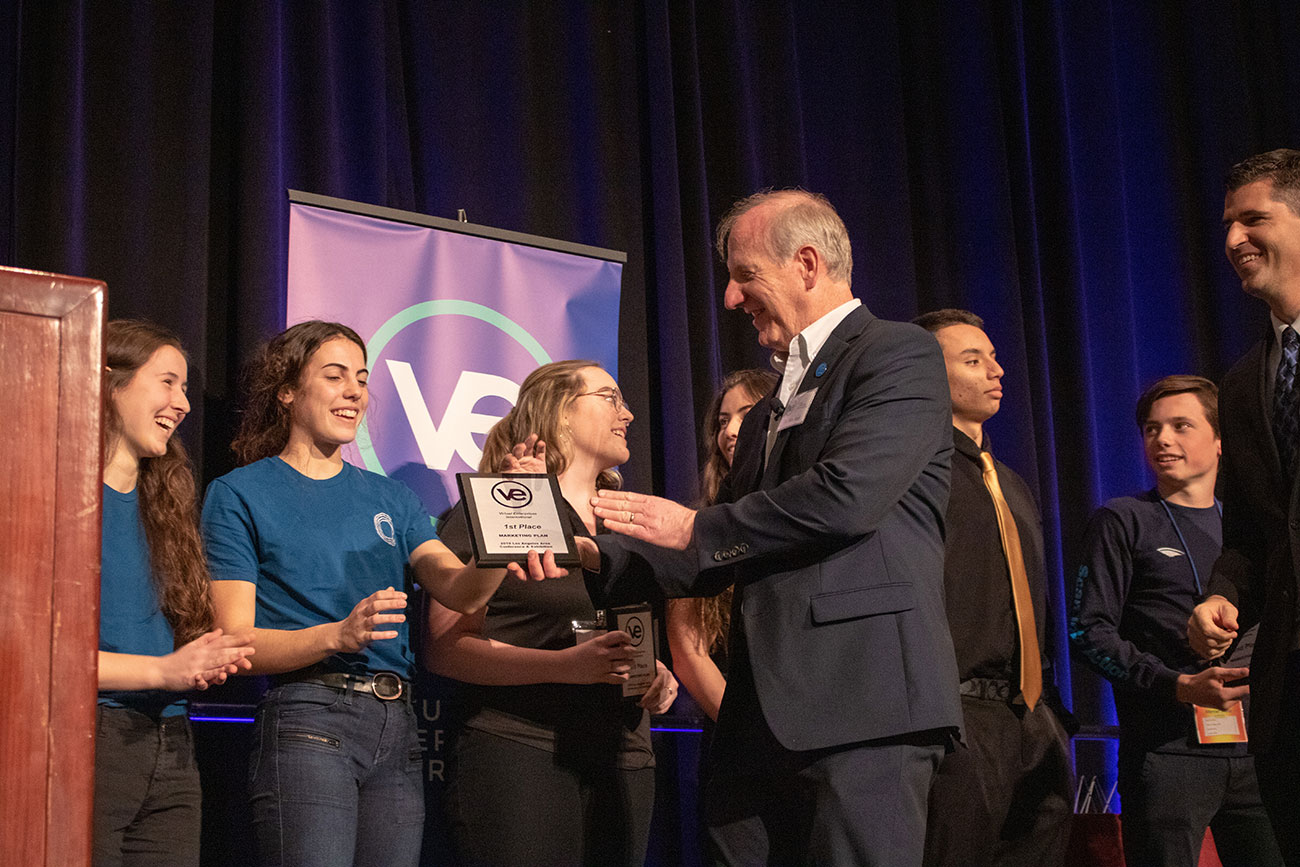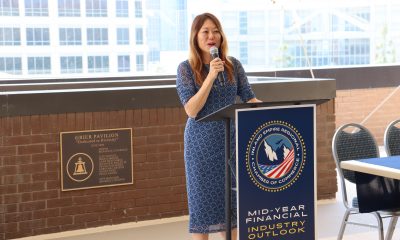Business
CSUSB Entrepreneurship Made a Big Splash at the Virtual Enterprise Expo

On Tuesday, February 19th, at the Pasadena Convention Center, the Inland Empire Center for Entrepreneurship (IECE) (http://entre.csusb.edu) was on scene as the headlining sponsor in support of the annual Regional Virtual Enterprise Conference & Exhibition Competition. The event represented a unique opportunity to reinforce the value of entrepreneurship to young business-minded professional, high school students from four surrounding counties of San Diego, Inland Empire, Riverside, and Los Angeles as well as some participants from the state of New York.
This event was attended by over 1,600 Virtual Enterprise (VE) students from 430 different schools who networked, competed, and showcased their budding business concepts to professional business judges. Among the activities, IECE sponsored the Elevator Pitch Competition, Business Trade Show Booth Design, and the Marketing Plan Competition. IECE also presented a trade show booth, making direct introductions and gaining interest and recruiting for the CSUSB Entrepreneurship program. Students were excited to learn of all the unique attributes of available resources offered to them by CSUSB campus and hundreds were very interested to learn more about the UpStarters Discovery Camp rolling out in summer 2019.
IECE offered up expertise within additional show format arenas and held “Coffee Talk” session hosted by our Entrepreneur in Residence, Steve Abbott. The format allowed Abbott to directly engage with students and deliver a realistic picture of what it looks like to actually develop your business while pursuing your college degree.
Prior to the closing ceremony, CSUSB Theater Art & Improv. Professor, Johanna Smith delivered a highly anticipated “Improvisational Mind” workshop. This Theater Arts course for Entrepreneurship students demonstrates the unique value that CSUSB Entrepreneurship programs brings to its potential student body. The VE students who participated in the workshop had praise-worthy reviews!
“Prior to this experience, I was a big fan of theatre but I never thought that I was capable of doing anything to that degree of skill. I always thought of myself as slow-witted, so, I never really tried, but your workshop really brought me out of my comfort zone! I think this experience will definitely play into my approach to salesmanship from now on and I feel a lot more comfortable with impromptu speaking. Thank you a lot for taking time out of your day to make our stressful day a little less stressful!” -Vivian Le, VE Student.
“I wanted to express my gratitude to Johanna Smith for her amazing workshop. Coming into the workshop, I was not quite sure what to expect. However, I quickly caught on and was pleasantly surprised. The workshop pushed me to try things that I had never done before. I think that the workshop really brought to light a new side of me and allowed me to grow as a person. I really appreciate Ms. Smith taking her time to host the workshop and I hope that she is able to come again next year to help even more students.” – Ethan Nguyen, CEO of Ecocentric.
The event closing keynote presentation was delivered by Dr. Mike Stull, Director of IECE and academic professor of entrepreneurship. Dr. Stull gave a highly energized talk covering the “Top 5 Rookie Mistakes of Entrepreneurship.” Dr. Stull’s address was well received by the crowd of students. Closing out the event, Dr. Stull and VE California Regional Director Teri Jones presented the top awards to all of the winning students for various competitive categories, including the sponsored IECE Elevator Pitch Competition.
Students reaching the top prizes in their respective competitions will now move on to compete in the national Youth Business Summit, which is a one-of-a-kind global business convention for VE students, held in New York later this year.
Virtual Enterprises (VE) is an educational nonprofit, transforming students into business professionals by bringing the workplace into the classroom. Since its inception in 1996, VE has served over 140,000 students, including many from economically disadvantaged communities. VE’s team includes a community of educators, business leaders, and post-secondary partners who help guide their mission. They currently support over 15,000 students across 19 states each year, working with schools and districts to implement a year-long, credited class that provides students with an authentic, collaborative business, and entrepreneurship experience through its live global business simulation model. Learn more veinternational.org.
Business
Local Veteran and His Family Open New Graze Craze Charcuterie Business in Murrieta, California

Southern California wine country gets another stylish culinary option, offering beautifully designed, hand-crafted grazing boards and picnic boxes
Graze Craze® has opened a new location close to the wine country of Southern California, where its artfully arranged sweet and savory grazing boards and boxes create a perfect pairing for food lovers. Located at 24530 Village Walk Place, Suite C, in Village Walk Plaza, the 1,021-square-foot store is owned and operated by disabled veteran Chris Stout and his wife, Stephanie Stout, with assistance from their teenage children.
At Graze Craze, highly trained experts known as Grazologists™ skillfully design charcuterie arrangements that feature an assortment of fine ingredients perfect for grazing, like fresh fruits and vegetables, premium meats and cheeses, artisanal sweets, nuts, house-made jams and more.
Chris Stout enlisted in the U.S. Navy in 2001 and served several deployments before being discharged in 2012. Since then, he has worked as a field service engineer for an electronics company and in manufacturing sales. Stephanie Stout has a bachelor’s degree in business accounting from the University of Phoenix and worked for an insurance broker before the couple’s first child was born; she then devoted herself full-time to raising their three children, who are now in high school.
Graze Craze charcuterie boards offer something for every lifestyle, dietary preference or palate and are available in a variety of size options to cater to any occasion, big or small. They incorporate a medley of flavors, like the fan-favorite Gone Grazey board, a perfectly balanced mix of cured meats, premium cheeses, crackers, fresh produce, nuts and more. The Vegegrazian is impeccably designed with a plethora of fresh fruits and vegetables for anyone embracing a plant-based lifestyle. Those with an undeniable sweet tooth can enjoy the Sweet & Grazey, a hand-crafted board featuring an abundance of delectable desserts like chocolates and baked goods paired with sweet dips to accent the irresistible flavors.
New to the Graze Craze menu is the Brunch Board, a gourmet and innovative twist on any morning routine. Packed with breakfast meats, fresh fruits, eggs, pastries and more, this board is the perfect bagel-and-donut brunch alternative. Grazers can also tackle watch-party cravings with a seasonal Game Day Board, featuring a feast of
crowd-pleasing ingredients, like peppered salami, Italian prosciutto, goat cheese, cranberry walnut bread, raspberry jam and chocolate bark, to name a few.
The artisan-inspired charcuterie offerings at Graze Craze are available in different size options, from Char-Cutie-Cups and Picnic Boxes for nibbling to sharing-size boards with enough fresh food to feed a large party. The food displays are ideal for elevating work meetings, family gatherings, lavish events and more, while they also make for memorable gifts that impress.
Besides sharing the flavorful menu with the area, the Stouts are actively involved in numerous local school, business and community organizations. The pair supports the Murrieta Valley High School Marching Band Boosters and California High School Rodeo Association District 8, in addition to the Boy Scouts of America California Inland Empire Council and Friends of Temecula Troop 309, where Christopher Stout is a part of the adult leadership team. The couple has also worked with Homes For Our Troops, an impactful nonprofit organization that builds specially adapted homes for post-9/11 disabled veterans.
Graze Craze Murrieta is open for pick-up, catering and free local delivery Monday through Saturday from 9 a.m. to 6 p.m. and Sunday from 10 a.m. to 2 p.m. For more information, call 951-942-7293.
Business
Partners in Action: How CalOSBA is bridging the gap in funding and resources for Inland Empire small businesses

By Josaline Cuesta, California Program Director, Small Business Majority & IEBJ Content Contributor
For Tara Lynn Gray, Director of the California Office of the Small Business Advocate (CalOSBA), entrepreneurship has always been a core principle of her life. Her journey as an advocate for small businesses wasn’t built on textbooks, but on her family’s roots in small business ownership. As a young girl, she watched her grandmother empower and elevate Black women’s presences by styling their hair and instilling confidence in their personhood. She witnessed the direct impact of small businesses on community members in real time, and that’s always stayed with Tara.
As a key partner of Small Business Majority, she stands as a champion for the dreamers and risk-takers; the pillars of the communities across California and in the Inland Empire. I chatted with her to share more about her work at CalOSBA, what entrepreneurs can expect when they meet with a CalOSBA advisor, and the resources and community support available to help boost entrepreneurship in the Golden State.
Tell us about CalOSBA’s role in the small business community.
“California has the biggest small business community in the country, accounting for 4.1 million small businesses in 2023 alone. The overwhelming majority have no employees at all, except themselves, which means they don’t have a Board of Directors, expensive consultants, and they definitely don’t have lobbyists. I take my role as their advocate seriously, talking with and listening to small business owners from up and down the state. During the pandemic, we were under a very bright spotlight, administering nearly $5 billion in direct relief funding and we’re proud of the grant programs we still oversee. But that’s only a small part of what we do at CalOSBA.
My team connects small business owners to information and resources to help them get started, manage their business and, most importantly, to grow. If they’re looking for help, we want to be the first door they knock on. In addition, we offer Outsmart Disaster training, which focuses on how to mitigate risks associated with natural disasters and recovery avenues available to them. I always say the flagship of our office is our support for the statewide network of Small Business Centers, providing 1:1 business assistance and training for small business owners of all industries and in dozens of languages. In addition, supporting partners that deliver these services–all the federally funded centers like the Small Business Development Centers and the Women’s Business Centers but also Chambers of Commerce and other nonprofits—is a core function of my office. And a big source of pride because we know what a difference they make for their clients.”
What can small business owners expect from meeting with a California Small Business Center advisor?
“Small business owners can expect to meet someone who is fully invested in them. Our Centers cover the full spectrum of business needs, from writing a business plan and obtaining the right permits and licenses, to finding capital, planning a succession strategy and marketing to e-commerce. Our business advisors provide the experience and the objective perspective to help business owners optimize their best assets: ideas, energy, and ability to keep adapting and learning. And they do it because they love helping other people succeed. What’s more, business ownership can become isolating and it may be challenging for entrepreneurs to find assistance. But they don’t have to go at it alone–and they shouldn’t, when these no-cost and low-cost services are available to them.”
What’s the most rewarding part of your role at CalOSBA?
“I always say I have the best job in the state. And it’s because I frequently have the honor to watch someone’s dream come true. I love a ribbon-cutting ceremony–Every time, big or small. It means someone dreamed of accomplishing something and worked hard for it: They opened the doors to their business, they made a sale, and hopefully they will hire their first employee and then it’s off to the races. But no matter what happens to that business, that ribbon-cutting is a milestone they made happen for themselves. There are many other events I get invited to, where you can just see the hope and pride, and even fear in their faces. I’m often overwhelmed by the sheer emotion of it, and I’m always humbled that I get to participate in that person’s big milestone.”
What are some new programs that can benefit small business owners in the Inland Empire?
“The number one question my office gets asked is how to access small business financing. To help address this key need, we’re launching the Technical Assistance for Capital Readiness program this February. The program is part of a bigger effort to fill well-known funding gaps in the state to benefit very small businesses and Socially and Economically Disadvantaged Individuals (SEDI). Through investments from the U.S. Treasury, the State Treasurer’s Office and IBank, the program is going to support lenders to facilitate “high risk” loans that they normally would not approve.
In addition to supporting lenders, my office also received $25.3 million in U.S. Treasury funding to start the new Capital Readiness network. The Capital Readiness Coaches in this network will help business owners get ready for the lending marketplace, help them make the best choices in a high interest-rate environment, and optimize the use of the capital once they receive it. The network is also designed to help spread the word about this opportunity to these SEDI-owned businesses, and some of those partners will be focused on supporting the Inland Empire small business ecosystem.”
How can business owners get in touch with CalOSBA?
“That’s simple! Check out calosba.ca.gov and sign up for our monthly newsletter, where I write a column and showcase success stories from our network, along with deadlines and updates on grant and workforce support programs. We’re also on social media, so I would encourage business owners to check out all of our channels.”
Business
2024 Banking & Financial Industry Outlook: Where Knowledge Meets Opportunity in California’s Financial Landscape

In an age where financial trends rapidly evolve and economic landscapes shift with increasing unpredictability, the Inland Empire Regional Chamber of Commerce stands as a beacon of knowledge and opportunity. It proudly announces its sold-out annual event, the Financial Industry Update, an exclusive gathering tailor-made for California and the Inland Empire region. This prestigious event is set to unfold on January 18, 2024, at the Ontario International Airport Authority Conference Center, promising an enriching experience for attendees.
A Gathering of Minds in the Financial Sphere
The Financial Industry Update is more than just an event; it’s a crucial nexus for professionals, businesses, and community leaders keen on gaining a deeper understanding of the financial nuances specific to California and the Inland Empire. This year’s event is particularly significant, given the rapid changes and challenges facing the financial sector in the region.
Keynote Speaker: A Treasury of Knowledge
Leading the charge is none other than California State Treasurer Fiona Ma, a figure renowned for her acumen in public finance, economic development, and responsible fiscal management. Her role as the keynote speaker underscores the event’s stature, offering invaluable insights into the financial future of California and the Inland Empire.
Featured Speakers: A Diverse Spectrum of Expertise
Joining Treasurer Ma is a lineup of distinguished speakers, each bringing unique perspectives and expertise:
- Ivo Tjan: As the Chairman, President, and CEO of CommerceWest Bank, Tjan’s journey from founding the company to leading it through an IPO is nothing short of inspirational. His leadership and insights are eagerly anticipated.
- Hilda Kennedy: The Founder/President of AmPac CDC and a trailblazer in local government and economic development, Kennedy’s impact on small businesses and community financing is profound.
- Edward Ornelas, Jr.: The visionary force behind the Inland Empire Regional Chamber of Commerce, Ornelas’s innovative approaches to business and economic development have redefined the region’s business narrative.
Event Highlights: More Than Just Talks
The event promises more than just insightful presentations. It’s a unique opportunity for networking, where professionals can connect, collaborate, and engage with potential partners and influential community figures. The interactive Q&A sessions will allow attendees to delve deeper into subjects, clarifying doubts and gaining more profound knowledge.
A Confluence of Opportunity and Expertise
This event symbolizes the intersection of knowledge and opportunity in California’s dynamic financial landscape. It’s a platform where insights are shared, connections are made, and the future of the financial industry in the Inland Empire is contemplated and shaped.
As January 18 approaches, the anticipation among California’s financial community continues to build. This event is not just a meeting of minds; it’s a forge where the future of financial industry trends and strategies will be hammered out, shaping the economic future of the Inland Empire and beyond.
For more information about the event and the Inland Empire Regional Chamber of Commerce, visit www.iechamber.org
-

 Opinion1 month ago
Opinion1 month agoSurge in Unemployment Among California Youth Linked to Minimum Wage Hikes
-

 Commercial Real Estate Transactions3 weeks ago
Commercial Real Estate Transactions3 weeks agoSRS Real Estate Partners Announces Record-Breaking $6.15 Million Ground Lease Sale of a New Construction Chick-fil-A Property in Murrieta, California
-

 Health & Wellness3 weeks ago
Health & Wellness3 weeks agoBuddha Bars: A Mother’s Innovative Solution to Healthy Snacking
-
By Press Release1 week ago
California Employment Expansion Continues But Still Trails Nation








